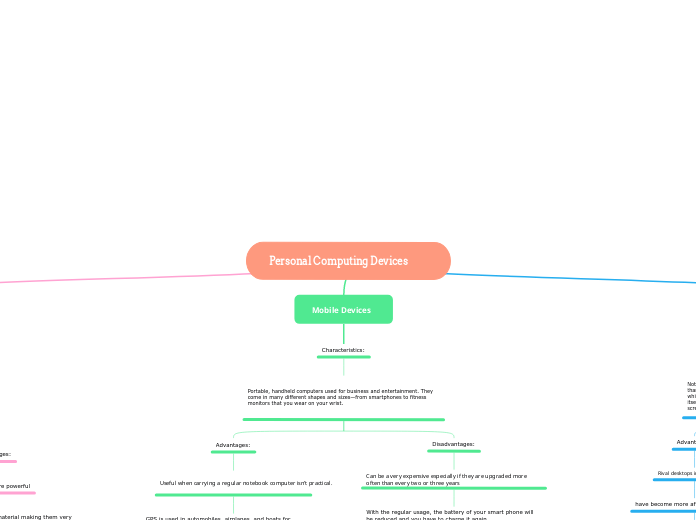Personal Computing Devices
Desktop
Characteristics:
Disadvantages:
They consume more energy
Collect a lot of dust, especially in the deepest corners of the computer tower.
each part needs cleaning separately
very heavy
larger and more powerful
Made of a single piece of sturdy material making them very durable.
If the power goes out, your computer won’t lose data.
The computer has high disk space so a lot of information can be stored on the PC.
Mobile Devices
Characteristics:
GPS is used in automobiles, airplanes, and boats for navigation and tracking.
Hands-free devices can be used for health monitoring, communications, military operations, and entertainment.
Can connect to a mobile data network; many tablets offer mobile data connectivity as well.
Disadvantages:
Can be a very expensive especially if they are upgraded more often than every two or three years
With the regular usage, the battery of your smart phone will be reduced and you have to charge it again.
Mobile data, however, comes at a premium and can be more expensive than a standard broadband connection.
Modern operating systems are relatively secure, but the devices are still miniature computers that can be affected by malware
Notebook
Characteristics:
Advantages:
Rival desktops in power and storage
have become more affordable and popular
Are portable and convertible ones enable you to write directly on the screen.
Lightweight, compact size, and have a built-in battery within the laptop
they have more clear and high-tech digital monitor display
Disadvantages:
can cost significantly more than a
comparable desktop system.
may not be suitable for all business applications or uses.
Features may be limited or unavailable due to power requirements, computing capabilities or space
Netbooks ship with special processors (different from those in laptops and desktops) and are less powerful
no upgradibility
